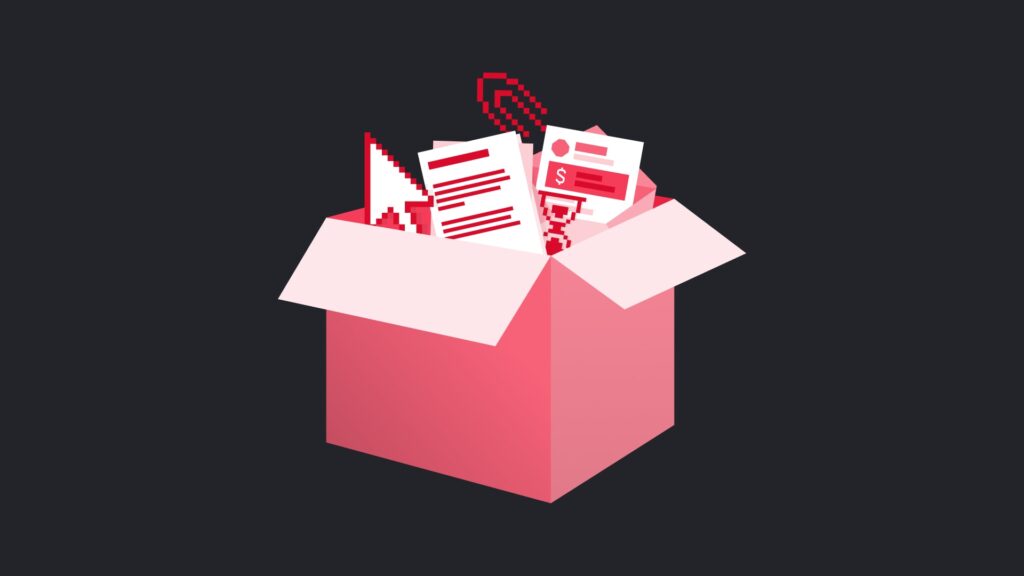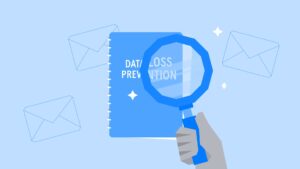Our latest research into The Great Resignation contains some startling statistics from IT security leaders. 71% told us the Great Resignation has increased security risks in their company. What’s more, 45% say incidents of data exfiltration have increased in the last year, as people took data when they left their jobs.
But we also got the employees’ perspective. And it was clear that many staff thought that at least some of the work that they did while at their employer belonged to them. Not only that, it was okay to take that work with them when they moved on from the organization.
In fact one in three (29%) employees surveyed admitted to having taken data with them when they quit. And when you isolate employees in the US, this jumps to two-fifths (40%).
So here’s the question ‘does your work belong to you?
Who’s taking data?
We saw noticeable differences in behaviors across typical departments found in most organizations. And the number one team to exfiltrate data? Marketing. A whopping 63% of respondents in this department admitted to taking data when they move on.
After marketing, employees in HR (37%) and IT (37%) had the next highest levels of exfiltration. Incidentally, rates of data exfiltration are much lower in highly regulated functions like accounting and finance, operations and legal, as these sectors have to comply with strict data regulations on a daily basis. Just 16% of workers in operations and 22% in accounting and finance say they have taken data with them when they’ve left a job.
[infogram id=”https://infogram.com/whos-taking-data-with-them-when-they-leave-1h7g6k0kyrpv02o?live”]
Why are people taking data on their way out?
According to Infosecurity magazine, 70% of intellectual property (IP) theft occurs within the 90 days before an employee’s resignation announcement. But why are people taking data when they leave? Here are some of the most common reasons.
Competitive advantage
Maliciously-minded insiders can steal company data to get a competitive edge in their new role. 58% of workers we surveyed told us the information would help them in their new job. Think customer lists, software, project documents, frameworks and methodologies, and ultimately, IP.. This is more common than you might think. For example, a General Electric employee was imprisoned in 2020 for stealing the company’s trade secrets for his own business in China.
A belief they own it
Many employees have a mentality that if they worked on that presentation, source code, or project, it’s theirs. In fact 53% of respondents to our survey felt this way, saying that because they worked on the document, and they believed the information belonged to them.
Financial gain
The right sort of data in the wrong hands can be extremely valuable. Former staff can sell customer’s information on the dark web. There’s a huge market for personal information—research suggests you can steal a person’s identity for around $1,100. 40% of the people we surveyed said they intended to make money from the information.
So who does own your work?
But back to our original question. Does your work belong to you? Well, chances are – no. In nearly all sectors and jurisdictions, if you’re fully employed by the company they own the output of your endeavors. The situation might be slightly different if you’re a freelance contractor. In the end it all comes down to the contract.
But there are exceptions. Obviously personal items that belonged to you prior to starting employment remain yours. Secondly, you can leave with items that you have permission to take. There’s also knowledge that you obtained during the role – such as the names of the firm’s five biggest customers. This is why many senior roles in firms have non-compete clauses built into their employment contracts.
What does The Great Resignation mean for security teams?
With 55% of respondents revealing that they’re thinking about leaving their jobs in 2022, and two in five (39%) currently working their notice or actively looking for a new job in the next 6 months, it’s clear IT and security teams are under pressure to keep company data safe during the Great Resignation.
But this research shouldn’t be used to berate employees – as an security leader, that’s not your job. Rather it should be used to refresh the dialogue about security culture, and weave it into broader discussion about data loss prevention.
Josh Yavor, Chief Information Security Officer at Tessian comments, “It’s a rather common occurrence for employees in certain roles and teams to take data when they quit their job. While some people do take documents with malicious intent, many don’t even realize that what they are doing is wrong. Organizations have a duty to clearly communicate expectations regarding data ownership, and we need to recognize where there might be a breakdown in communication which has led to a cultural acceptance of employees taking documents when they leave.
“The Great Resignation, and the sharp increase in employee turnover, has exposed an opportunity for security and business leaders to consider a more effective way of addressing insider risk. It comes down to building better security cultures, gaining greater visibility into data loss threats, and defining and communicating expectations around data sharing to employees – both company-wide and at departmental level. Being proactive in setting the right policies and expectations is
How does Tessian prevent data exfiltration attempts?
Prevent unauthorized emails
Whether it’s an employee sending sensitive information to less secure, personal accounts or a bad leaver maliciously exfiltrating data, Tessian automatically prevents data exfiltration over email.
Learn more
Deeply understand your risk
Whether careless, negligent, or malicious, insider threats are difficult to combat and even harder to detect. But with Tessian, you can quickly find and report the key areas of insider risk, use insights to predict future behavior, and take remedial action to prevent exfiltrations attempts.
Learn more
In-the-moment educational warnings
Tessian warnings act as in-the-moment training for employees, continuously educating them about treats, reinforcing your policies, and nudging them toward safe email behavior. Automatically build individualized policies at scale to reduce high-risk email use and track trends in unsafe activity over time.
Learn more
Andrew Webb
Senior Content Manager










